About Security, Inteoperability, Ecosystem and other Highlights in the IoT
By Alicia Asín and David Gascón, co founders of Libelium

 Zaragoza (Spain), December 2017
A year ago, we published a summary of what was decided to be the trends and realities of the IoT and this year the article has been revised to make a small update. To be honest, there are some trends that keep on moving but if we have to say what is new this year in the IoT, we think that the perspective of the Internet of Things has changed to IoT platforms, giving importance to partnerships and the ecosystem.
In addition, emerging technologies are strongly related to the IoT and security is becoming very important for crowd technologies and for the whole of society, which leads us to think that we are reaching a wider sophistication in the market.
There is also a trend to move from “the more sensors, the better” to “the more precise, the better”. In fact, Libelium was the pioneer company in the beginning of this matter and nowadays the paradigm has changed and it is the customer who demands that precision. At first, Libelium lead the conversation on educating customers to spend a little more on accurate devices than investing on more unsecured sensors. This change of mind reflects the maturity of the current market and many semiconductor companies are leading the race towards more precise sensors.
Zaragoza (Spain), December 2017
A year ago, we published a summary of what was decided to be the trends and realities of the IoT and this year the article has been revised to make a small update. To be honest, there are some trends that keep on moving but if we have to say what is new this year in the IoT, we think that the perspective of the Internet of Things has changed to IoT platforms, giving importance to partnerships and the ecosystem.
In addition, emerging technologies are strongly related to the IoT and security is becoming very important for crowd technologies and for the whole of society, which leads us to think that we are reaching a wider sophistication in the market.
There is also a trend to move from “the more sensors, the better” to “the more precise, the better”. In fact, Libelium was the pioneer company in the beginning of this matter and nowadays the paradigm has changed and it is the customer who demands that precision. At first, Libelium lead the conversation on educating customers to spend a little more on accurate devices than investing on more unsecured sensors. This change of mind reflects the maturity of the current market and many semiconductor companies are leading the race towards more precise sensors.
 One of the milestones of this year has been the importance of security, not only by Libelium but on the entire ecosystem. This past year we have seen for the first time the newspaper portraits featuring an IoT attack. This fact shows how the general public is also concerned and worried about the security issues in the IoT Security era. Since in this case the technology affected things that have nothing to do with technology such as German trains, FedEx deliveries and many global companies, we can see the importance that should be given to security in the IoT. So, for the first time, it was clear that the new Internet paradigm needs to take security very seriously.
On the other hand, we find that there are things that have not changed, such as the battle between the different types of wireless connectivity protocols: WiFi, 3G, 4G, Zigbee, Sigfox, LoRaWAN, etc. The next would be NB-IoT but no projects are being carried out with this communication protocol at the moment. So, keeping on our agnostic point of view, we suggest not to expect to a unique wireless technology to conquer the market. There are many mature technologies ready to make money today and there will be always fragmentation as each technology has its own pros and cons.
One of the milestones of this year has been the importance of security, not only by Libelium but on the entire ecosystem. This past year we have seen for the first time the newspaper portraits featuring an IoT attack. This fact shows how the general public is also concerned and worried about the security issues in the IoT Security era. Since in this case the technology affected things that have nothing to do with technology such as German trains, FedEx deliveries and many global companies, we can see the importance that should be given to security in the IoT. So, for the first time, it was clear that the new Internet paradigm needs to take security very seriously.
On the other hand, we find that there are things that have not changed, such as the battle between the different types of wireless connectivity protocols: WiFi, 3G, 4G, Zigbee, Sigfox, LoRaWAN, etc. The next would be NB-IoT but no projects are being carried out with this communication protocol at the moment. So, keeping on our agnostic point of view, we suggest not to expect to a unique wireless technology to conquer the market. There are many mature technologies ready to make money today and there will be always fragmentation as each technology has its own pros and cons.
 Libelium is waiting expectantly to see which will be the dominant vertical on the IoT market, which is still too fragmented and influenced by the moment opportunity. As an example, Libelium has developed a white paper with the first 50 case studies that have been carried out to keep track of the performance of the Libelium technology. This publication includes projects related with smart cities, agriculture, environment, water, industry, parking, logistics and ehealth. And only 6 months later, we have 15 new success stories to add to this book which gives us an idea of the increasing speed at which projects in all sectors follow one another.
Libelium is waiting expectantly to see which will be the dominant vertical on the IoT market, which is still too fragmented and influenced by the moment opportunity. As an example, Libelium has developed a white paper with the first 50 case studies that have been carried out to keep track of the performance of the Libelium technology. This publication includes projects related with smart cities, agriculture, environment, water, industry, parking, logistics and ehealth. And only 6 months later, we have 15 new success stories to add to this book which gives us an idea of the increasing speed at which projects in all sectors follow one another.
 As a result of the big effort that Libelium and many other companies are making to reinforce their relationships, there is a bigger ecosystem map where we can find new names, others that have left the market, big and small companies. The only new thing is that the ecosystem knows the importance of itself, is inclusive, and is not dominated by large companies as all of them are working side by side to create solutions.
Nevertheless, Libelium is trying to organize its relationships with the ecosystem. We have launched more partnership programs than any other year, and we have already reached agreements with more than 100 partners, focusing specially on Meshlium IoT Gateway, one of the cores of the company.
As a result of the big effort that Libelium and many other companies are making to reinforce their relationships, there is a bigger ecosystem map where we can find new names, others that have left the market, big and small companies. The only new thing is that the ecosystem knows the importance of itself, is inclusive, and is not dominated by large companies as all of them are working side by side to create solutions.
Nevertheless, Libelium is trying to organize its relationships with the ecosystem. We have launched more partnership programs than any other year, and we have already reached agreements with more than 100 partners, focusing specially on Meshlium IoT Gateway, one of the cores of the company.
 As we are trying to solve the problem of interoperability, getting rid of everything else in the company, and focusing completely on the gateway, we have found new ways to extend this interoperability to any IoT project. Until now, we had cloud partners to connect the sensors to several cloud platforms. This year we also have opened the door to integrate other sensors and devices to Meshlium. As an example, we have partnered with Axis to reach a solution with video cameras which increases the accuracy of any project such as fire control, smart parking, urban mobility, pollution, etc. We are also allowing partners to integrate other sensors in our sensor platform, such as Sensorinsight, who asked Libelium to create a new family of sensors for agriculture to increase quality and adapt to their own cloud platform.
Shortly, Libelium will also be allowing the implementation of new sensors at the Plug & Sense! level and also new sensors to connect directly to the Plug & Sense! Platform. Of course, Libelium’s team keeps on working to make the deployment of these platforms easy and fast with kits ready to be deployed and available on The IoT Marketplace.
At the same time that the ecosystem matures, we have to expand our services and give our partners more possibilities. In 2018 we will present a new “Authorized Technical Service Certification” that will be launched for partners with the idea to extend the advanced technical support service that Libelium provides worldwide cooperating with partners at a closer level to create larger projects.
As we are trying to solve the problem of interoperability, getting rid of everything else in the company, and focusing completely on the gateway, we have found new ways to extend this interoperability to any IoT project. Until now, we had cloud partners to connect the sensors to several cloud platforms. This year we also have opened the door to integrate other sensors and devices to Meshlium. As an example, we have partnered with Axis to reach a solution with video cameras which increases the accuracy of any project such as fire control, smart parking, urban mobility, pollution, etc. We are also allowing partners to integrate other sensors in our sensor platform, such as Sensorinsight, who asked Libelium to create a new family of sensors for agriculture to increase quality and adapt to their own cloud platform.
Shortly, Libelium will also be allowing the implementation of new sensors at the Plug & Sense! level and also new sensors to connect directly to the Plug & Sense! Platform. Of course, Libelium’s team keeps on working to make the deployment of these platforms easy and fast with kits ready to be deployed and available on The IoT Marketplace.
At the same time that the ecosystem matures, we have to expand our services and give our partners more possibilities. In 2018 we will present a new “Authorized Technical Service Certification” that will be launched for partners with the idea to extend the advanced technical support service that Libelium provides worldwide cooperating with partners at a closer level to create larger projects.
 The market continues growing and we must continue making efforts from our marketing department to speed up the IoT adoption. This is why we have created the quick start guides for all the kits we sell “ready to be deployed” on the IoT Marketplace. And we have also started a series of webinars in collaboration with all our partners presenting real solutions developed with Libelium technology.
We will only be able to show the potential of the IoT if we teach real cases and practical examples of what can be created based on the devices connected to a particular platform and application. Only then will we generate the inspiration others need to start new projects.
The market continues growing and we must continue making efforts from our marketing department to speed up the IoT adoption. This is why we have created the quick start guides for all the kits we sell “ready to be deployed” on the IoT Marketplace. And we have also started a series of webinars in collaboration with all our partners presenting real solutions developed with Libelium technology.
We will only be able to show the potential of the IoT if we teach real cases and practical examples of what can be created based on the devices connected to a particular platform and application. Only then will we generate the inspiration others need to start new projects.
The importance of security and the power of the ecosystem, drive the battle for the IoT’s interoperability in which Libelium plays a key role by offering
both the integration of hardware devices and software services throughout the value chain.

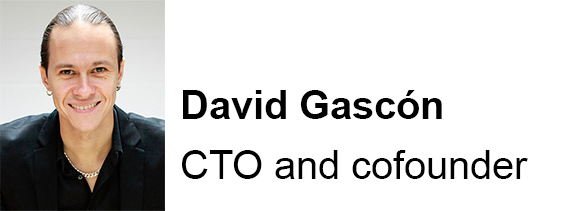 Zaragoza (Spain), December 2017
A year ago, we published a summary of what was decided to be the trends and realities of the IoT and this year the article has been revised to make a small update. To be honest, there are some trends that keep on moving but if we have to say what is new this year in the IoT, we think that the perspective of the Internet of Things has changed to IoT platforms, giving importance to partnerships and the ecosystem.
In addition, emerging technologies are strongly related to the IoT and security is becoming very important for crowd technologies and for the whole of society, which leads us to think that we are reaching a wider sophistication in the market.
There is also a trend to move from “the more sensors, the better” to “the more precise, the better”. In fact, Libelium was the pioneer company in the beginning of this matter and nowadays the paradigm has changed and it is the customer who demands that precision. At first, Libelium lead the conversation on educating customers to spend a little more on accurate devices than investing on more unsecured sensors. This change of mind reflects the maturity of the current market and many semiconductor companies are leading the race towards more precise sensors.
Zaragoza (Spain), December 2017
A year ago, we published a summary of what was decided to be the trends and realities of the IoT and this year the article has been revised to make a small update. To be honest, there are some trends that keep on moving but if we have to say what is new this year in the IoT, we think that the perspective of the Internet of Things has changed to IoT platforms, giving importance to partnerships and the ecosystem.
In addition, emerging technologies are strongly related to the IoT and security is becoming very important for crowd technologies and for the whole of society, which leads us to think that we are reaching a wider sophistication in the market.
There is also a trend to move from “the more sensors, the better” to “the more precise, the better”. In fact, Libelium was the pioneer company in the beginning of this matter and nowadays the paradigm has changed and it is the customer who demands that precision. At first, Libelium lead the conversation on educating customers to spend a little more on accurate devices than investing on more unsecured sensors. This change of mind reflects the maturity of the current market and many semiconductor companies are leading the race towards more precise sensors.
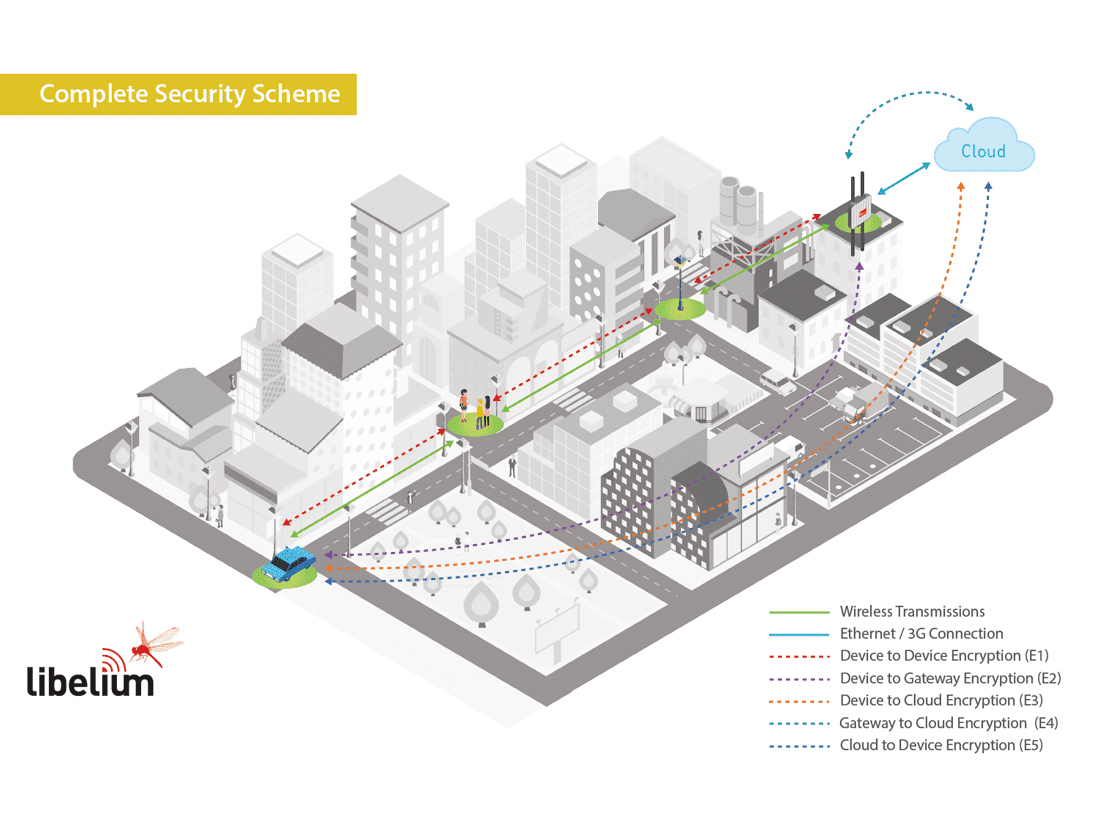 One of the milestones of this year has been the importance of security, not only by Libelium but on the entire ecosystem. This past year we have seen for the first time the newspaper portraits featuring an IoT attack. This fact shows how the general public is also concerned and worried about the security issues in the IoT Security era. Since in this case the technology affected things that have nothing to do with technology such as German trains, FedEx deliveries and many global companies, we can see the importance that should be given to security in the IoT. So, for the first time, it was clear that the new Internet paradigm needs to take security very seriously.
On the other hand, we find that there are things that have not changed, such as the battle between the different types of wireless connectivity protocols: WiFi, 3G, 4G, Zigbee, Sigfox, LoRaWAN, etc. The next would be NB-IoT but no projects are being carried out with this communication protocol at the moment. So, keeping on our agnostic point of view, we suggest not to expect to a unique wireless technology to conquer the market. There are many mature technologies ready to make money today and there will be always fragmentation as each technology has its own pros and cons.
One of the milestones of this year has been the importance of security, not only by Libelium but on the entire ecosystem. This past year we have seen for the first time the newspaper portraits featuring an IoT attack. This fact shows how the general public is also concerned and worried about the security issues in the IoT Security era. Since in this case the technology affected things that have nothing to do with technology such as German trains, FedEx deliveries and many global companies, we can see the importance that should be given to security in the IoT. So, for the first time, it was clear that the new Internet paradigm needs to take security very seriously.
On the other hand, we find that there are things that have not changed, such as the battle between the different types of wireless connectivity protocols: WiFi, 3G, 4G, Zigbee, Sigfox, LoRaWAN, etc. The next would be NB-IoT but no projects are being carried out with this communication protocol at the moment. So, keeping on our agnostic point of view, we suggest not to expect to a unique wireless technology to conquer the market. There are many mature technologies ready to make money today and there will be always fragmentation as each technology has its own pros and cons.
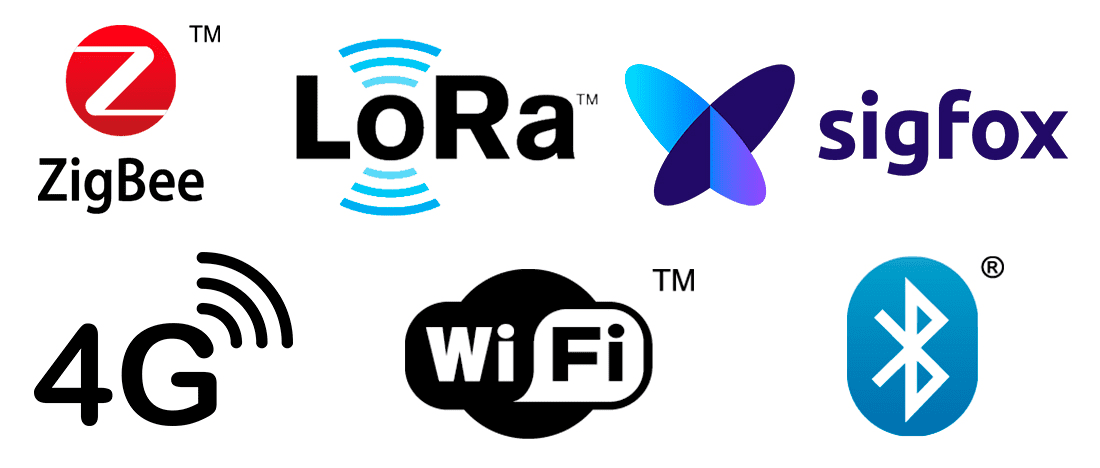 Libelium is waiting expectantly to see which will be the dominant vertical on the IoT market, which is still too fragmented and influenced by the moment opportunity. As an example, Libelium has developed a white paper with the first 50 case studies that have been carried out to keep track of the performance of the Libelium technology. This publication includes projects related with smart cities, agriculture, environment, water, industry, parking, logistics and ehealth. And only 6 months later, we have 15 new success stories to add to this book which gives us an idea of the increasing speed at which projects in all sectors follow one another.
Libelium is waiting expectantly to see which will be the dominant vertical on the IoT market, which is still too fragmented and influenced by the moment opportunity. As an example, Libelium has developed a white paper with the first 50 case studies that have been carried out to keep track of the performance of the Libelium technology. This publication includes projects related with smart cities, agriculture, environment, water, industry, parking, logistics and ehealth. And only 6 months later, we have 15 new success stories to add to this book which gives us an idea of the increasing speed at which projects in all sectors follow one another.
 As a result of the big effort that Libelium and many other companies are making to reinforce their relationships, there is a bigger ecosystem map where we can find new names, others that have left the market, big and small companies. The only new thing is that the ecosystem knows the importance of itself, is inclusive, and is not dominated by large companies as all of them are working side by side to create solutions.
Nevertheless, Libelium is trying to organize its relationships with the ecosystem. We have launched more partnership programs than any other year, and we have already reached agreements with more than 100 partners, focusing specially on Meshlium IoT Gateway, one of the cores of the company.
As a result of the big effort that Libelium and many other companies are making to reinforce their relationships, there is a bigger ecosystem map where we can find new names, others that have left the market, big and small companies. The only new thing is that the ecosystem knows the importance of itself, is inclusive, and is not dominated by large companies as all of them are working side by side to create solutions.
Nevertheless, Libelium is trying to organize its relationships with the ecosystem. We have launched more partnership programs than any other year, and we have already reached agreements with more than 100 partners, focusing specially on Meshlium IoT Gateway, one of the cores of the company.
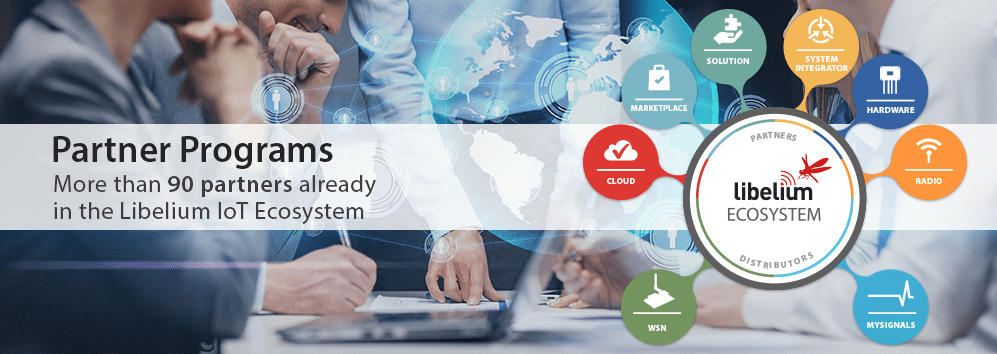 As we are trying to solve the problem of interoperability, getting rid of everything else in the company, and focusing completely on the gateway, we have found new ways to extend this interoperability to any IoT project. Until now, we had cloud partners to connect the sensors to several cloud platforms. This year we also have opened the door to integrate other sensors and devices to Meshlium. As an example, we have partnered with Axis to reach a solution with video cameras which increases the accuracy of any project such as fire control, smart parking, urban mobility, pollution, etc. We are also allowing partners to integrate other sensors in our sensor platform, such as Sensorinsight, who asked Libelium to create a new family of sensors for agriculture to increase quality and adapt to their own cloud platform.
Shortly, Libelium will also be allowing the implementation of new sensors at the Plug & Sense! level and also new sensors to connect directly to the Plug & Sense! Platform. Of course, Libelium’s team keeps on working to make the deployment of these platforms easy and fast with kits ready to be deployed and available on The IoT Marketplace.
At the same time that the ecosystem matures, we have to expand our services and give our partners more possibilities. In 2018 we will present a new “Authorized Technical Service Certification” that will be launched for partners with the idea to extend the advanced technical support service that Libelium provides worldwide cooperating with partners at a closer level to create larger projects.
As we are trying to solve the problem of interoperability, getting rid of everything else in the company, and focusing completely on the gateway, we have found new ways to extend this interoperability to any IoT project. Until now, we had cloud partners to connect the sensors to several cloud platforms. This year we also have opened the door to integrate other sensors and devices to Meshlium. As an example, we have partnered with Axis to reach a solution with video cameras which increases the accuracy of any project such as fire control, smart parking, urban mobility, pollution, etc. We are also allowing partners to integrate other sensors in our sensor platform, such as Sensorinsight, who asked Libelium to create a new family of sensors for agriculture to increase quality and adapt to their own cloud platform.
Shortly, Libelium will also be allowing the implementation of new sensors at the Plug & Sense! level and also new sensors to connect directly to the Plug & Sense! Platform. Of course, Libelium’s team keeps on working to make the deployment of these platforms easy and fast with kits ready to be deployed and available on The IoT Marketplace.
At the same time that the ecosystem matures, we have to expand our services and give our partners more possibilities. In 2018 we will present a new “Authorized Technical Service Certification” that will be launched for partners with the idea to extend the advanced technical support service that Libelium provides worldwide cooperating with partners at a closer level to create larger projects.
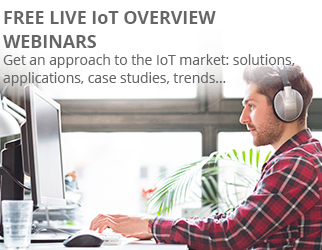 The market continues growing and we must continue making efforts from our marketing department to speed up the IoT adoption. This is why we have created the quick start guides for all the kits we sell “ready to be deployed” on the IoT Marketplace. And we have also started a series of webinars in collaboration with all our partners presenting real solutions developed with Libelium technology.
We will only be able to show the potential of the IoT if we teach real cases and practical examples of what can be created based on the devices connected to a particular platform and application. Only then will we generate the inspiration others need to start new projects.
The market continues growing and we must continue making efforts from our marketing department to speed up the IoT adoption. This is why we have created the quick start guides for all the kits we sell “ready to be deployed” on the IoT Marketplace. And we have also started a series of webinars in collaboration with all our partners presenting real solutions developed with Libelium technology.
We will only be able to show the potential of the IoT if we teach real cases and practical examples of what can be created based on the devices connected to a particular platform and application. Only then will we generate the inspiration others need to start new projects.
Let’s make together the IoT revolution real!
























